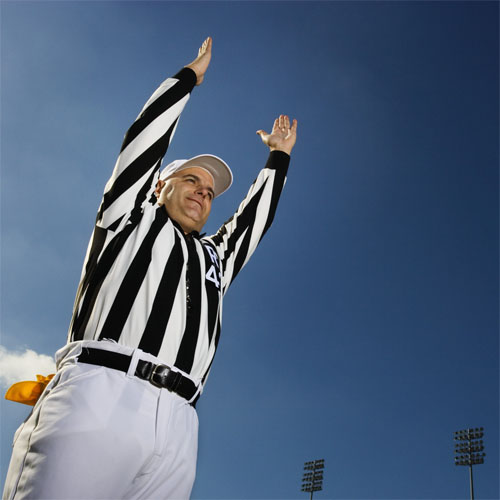
Zebra
Somewhere in, NJ
Male, 62
I've officiated football for over 30 years, now in my 26th on the college level. I've worked NCAA playoffs at the Division II and III level. In addition, I've coached at the scholastic level and have been an educator for over 35 years. I have no interest whatsoever in being an NFL official! Ever!
That is not a college or high school rule ad I'm not certain of the NFL rule. And I really can't respond to the philosophy that the NFL Competition Committee uses in creating rules.
There are fouls that can be tacked on to the end of the run. A defensive hold is not one. In college, for example, roughing the passer can be tacked on, even on a completed pass. And on kick plays (punt), if the defense was offsides, rather than rekick - if the team wouldn't get a first down with the penalty - that can be added to the end of the play. The idea there is to speed up play and also avoid additional fouls - and injuries - that can occur on kicks.
Didn't see that game and don't know what the ref said. But....
It isn't that the offense has to let the defense get "set"; the defense has to be allowed to "match up" if the offense makes changes late in the 40 second count. For example, if the offense is running a hurry up offense (or no huddle) and they do not substitute, there's no action taken. But the citation is Rule 3-5-2-e: "....Team A [offense] is prohibited from rushing quickly to the line of scrimmage with the obvious attempt of creating a defensive disadvantage. If the ball is ready for play, the game officials will not permit the ball to be snapped until Team B [defense] has placed substitutes in position and replaced players have left the field of play. Team B must react promptly with its substututes." The Referee and other officials will hold their arms out to the side ("iron cross") and the Umpire will stand over the ball preventing a snap.
There's a good deal of interpretation and judgment by the officials on such plays. And it is used often, but most times the defense makes its substitutions and the play goes off normally. Most games, fans don't even know it's happening. Obviously that wasn't the case here.
That's an illegal kick by the defensive lineman. College rules call for a ten yard penalty against the offending team - in this case the defense. So, no TD and, after accepting the penalty, it's still the offense's ball.
Bracketologist
 Why have there been so many 15-2 upsets, but no 16-1's?
Why have there been so many 15-2 upsets, but no 16-1's?
Bartender
 How often would you date customers?
How often would you date customers?
Firefighter
 What's the worst you've been burned in a fire?
What's the worst you've been burned in a fire?
Good point to raise. Officials try to maintain a steady pace, regardless of how fast the offense is going (no huddle, hurry up). However, as time is getting ready to expire in a half, officials will use one ball, the same one that was in the previous play, rather than substitute a new ball. There still has to be an opportunity for the defense to "match up", which means if the offense is subbing (even in a hurry up), the defense has to be given the opportunity to match subs (at least in college rules).
If it is ruled a forward pass (unlike the Patriots' play in the playoffs), it's an incomplete pass. On the other hand, if it is ruled a fumble -- as it was against the Pats -- then you have a safety. If anyone legally throws a forward pass - a punter, kick holder, a halfback - and it's incomplete, then it's, well, incomplete. The fact that it rolled out of the endzone is irrelevent.
Technically, you can decline any penalty. Running into is a five yard penalty. I've seen that often. If you don't get a first down with five yards and it was a great punt, flip the field and decline the penalty.
-OR-
 Login with Facebook
Login with Facebook (max 20 characters - letters, numbers, and underscores only. Note that your username is private, and you have the option to choose an alias when asking questions or hosting a Q&A.)
(A valid e-mail address is required. Your e-mail will not be shared with anyone.)
(min 5 characters)
By checking this box, you acknowledge that you have read and agree to Jobstr.com’s Terms and Privacy Policy.
-OR-
 Register with Facebook
Register with Facebook(Don't worry: you'll be able to choose an alias when asking questions or hosting a Q&A.)